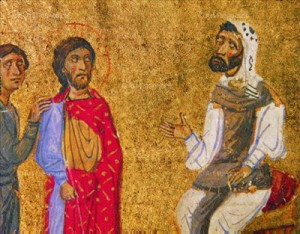For every complex question, as H.L. Mencken once put, there is usually an answer that is “clear, simple and wrong.”
His observation rings true when it comes to a question I get at least once a week. What do Jews believe about Jesus?Jews as a group rarely agree on matters of Jewish belief. How could we agree on the essence of another?
Yet, we ignore the question at our own peril.
Learning About Jesus Means Learning About Judaism
What lies behind it is a yearning for a deeper faith and understanding between Christians and Jews. For Christians a better understanding of Judaism leads to a better understanding of Jesus. For Jews it leads to a deeper appreciation of the world’s largest faith.
While scholars and historians can give us a critical and detailed picture of the first-century Jewish life in which Jesus lived and taught, rabbis can give us a better picture of his spirituality. What made his message resonate for Jews of the time and ultimately lead to the birth of a new religion?
Fortunately, over the last 100 years many rabbis have explored this issue, and the number of relevant books keeps growing. Here are five intriguing points of view:
1. A Jewish National Hero: Orthodox Rabbi Shmuley Boteach emphasizes Jesus’ self-understanding and significance as a political leader of first-century Jews. As he writes, “The more we peel away the surface, the more we see the truth: Jesus, I will continue to show, was a great political leader who fought for the liberation of his people.”
“In this sense, he saw himself in the guise of Moses and David, both of whom, while supremely concerned with the spiritual welfare of the people, were first and last concerned with the political freedom of the Jewish nation.” In other words, for Jews of the time, Jesus’ was a political hero and not a spiritual one.
2. The Penultimate Messiah: Rabbi Byron Sherwin places Jesus in the theological category of a precursor to the ultimate messiah. He serves a similar role as John the Baptist does for Christianity.
As Professor Shaul Magid puts it, “Yitz Greenberg and Byron Sherwin base their writings on Jesus on a more nuanced view of ‘the messiah’ in Judaism that distinguishes between a penultimate and ultimate messianic figure, each serving a crucial role in the messianic process.”
In other words, Jesus emerged out the yearning of first-century Jews for a national and spiritual savior, and his spiritual significance will be fulfilled in the future messianic period.
For Christians this event will be the second coming. For Jews it will be the “first coming,” which had been foreshadowed by Jesus. (This terminology of “first coming” is my language, and is not used by Greenberg or Sherwin. For the sake of brevity, I am summarizing their arguments and leaving out significance nuance that would be appropriate in a scholarly forum. See Zev Garber, ed., The Jewish Jesus: Revelation, Reflection, Reclamation, 2011)
3. A Righteous Leader: Rabbis Zalman Schachter-Shalomi and Daniel Matt place Jesus in the category of a Jewish Tzadik. A Tzadik is a person of unusual righteousness who serves as a bridge between his community and God. He is meant to exemplify Jewish virtue. He is “Torah incarnate,” but not God incarnate.
For Schachter-Shalomi and Matt, Jesus represented a more mystical pious Jewish outlook, in opposition to the legal doctrine and focus of the Pharisees. Jesus served the same function for first-century Judean Jews as the Hasidic movement would serve for eighteenth-century European Jews.
4. A Rabbi: The great nineteenth- and early twentieth-century American Rabbi Emil Hirsch wrote and spoke frequently about Jesus. He saw him as a champion of faith in human progress and a teacher of the Old Testament.
As Hirsch proclaimed from the pulpit, “He was of us; he is of us. We quote the rabbis of the Talmud; shall we then, not also quote the rabbi of Bethlehem? Shall not he in whom there burned, if it burned in any one, the spirit and the light of Judaism, be reclaimed by the synagogue?”
Hirsch’s point of view has been echoed in several contemporary books with the phrase “Rabbi Jesus” in their title.
5. An Ethical Exemplar: Emil Hirsch’s brother-in-law Kaufmann Kohler was also a prominent rabbi and scholar. He was president of the seminary for Reform Rabbis for 25 years.He wrote frequently about Jesus, and while he was critical of Jesus’ seeming dismissal of the law of the Old Testament, he highlighted his social message.
For Kohler, Jesus was a “helper of the poor” and a “sympathizing friend of the fallen.” He said Jesus learned these values at the synagogue and brought them to the forefront of first-century Jewish life.
As we can see, the Jewish understanding of Jesus is diverse. I have no doubt we will continue to uncover and learn more in the years ahead.
Rabbi Moffic’s newest book is Wisdom for People of All Faiths.


